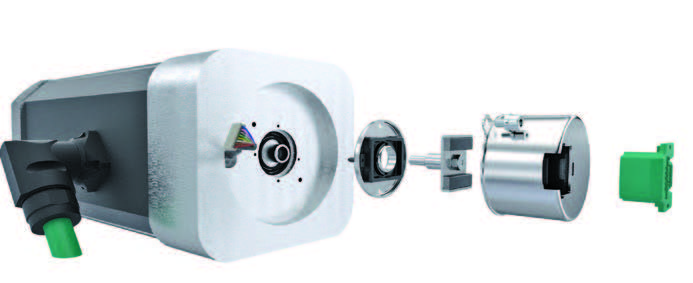Hamilton, N.J.-based POSITAL FRABA Inc. announced the availability of its multi-turn absolute kit encoders, which are designed for collaborative robots, industrial automation, or linear actuators.
The kit encoders include several features designed to reduce space requirements and cost. They include absolute-position feedback, compact bores, and an energy-harvesting design that eliminates the need for battery backup, according to the unit of Netherlands-based FRABA BV.
Franz Baumgartner elektrische Apparate GmbH was founded in Cologne, Germany, in 1918, and in 1973, FRABA introduced one of the first non-contact, absolute multi-turn encoders. POSITAL has been a leading manufacturer of industrial rotary encoders for more than 50 years, and has expanded its business to tilt and linear motion sensors.
POSITAL multi-turn encoders harvest energy
The Singleturn system is based on capacitive technology and is combined with POSITAL‘s proven Wiegand multi-turn technology. It eliminates the need for backup batteries or complex gear systems.
Batteries pose challenges for robotics designers including a limited lifespan, considerable weight, and toxic chemicals. Gear units bring weaknesses of their own, being large, complex, costly, and vulnerable to shock and vibration, POSITAL said.
Even at slow rotational speeds, the Wiegand system generates short voltage pulses that are enough to power the rotation counter and related electronics, said the company.
POSITAL said its contact-free measurement technology has no moving parts and is resistant to shock and vibration. The kit encoders are available with several non-proprietary electrical interfaces including BiSS-C or BiSS line. Additional protocols based on the RS485 interface can be implemented.

Multi-turn absolute kit encoders. Source: POSITAL FRABA
Compact hollow-shaft encoders work in cobots
POSITAL FRABA said its Through Hollow Shaft Kit encoders offer a wide multi-turn range without the need for a battery or gear system. The hollow shaft enables cables and compressed air to be routed inside a cobot arm.
The encoders are 18 mm thick, work with 30 and 50 mm shaft diameters, and include a 10 mm hollow bore suitable for NEMA 17 and larger frames. They offer a resolution of up to 19 bits and are designed for integration into large or frameless motors.
POSITAL offers multiple shaft sizes, including 6 mm and a compact 36 mm design for solid and hub shaft versions. It said it expects to release a 22 mm version soon.
The encoders are equipped with open BiSS-C and SSI electrical interfaces. The company also offers clamp, syncro, and square flange designs in 36, 52, and 58 mm sizes. The multi-turn absolute kit encoders include cable exit, connection cap, and connector options.

Kit encoders optimized
POSITAL FRABA said its compact incremental kit encoders are optimized for controlling the speed of small drives, low-power motors, and stepper motors. The optical incremental version is available as a module or as a complete kit including an optical disc.
Motor manufacturers that have or are developing their own high-resolution, single-turn encoder technology can use POSITAL’s multi-turn SPI Kit to upgrade their motors to a multi-turn version.
It is designed to count up to 40-bit revolutions and provides multi-turn and low-resolution single-turn data via a cost-efficient SPI slave interface. Note that single-turn data is needed for synchronization with the high-resolution external single-turn. Extensive diagnostic coverage and related data ensure reliable operation, said the company.
POSITAL FRABA simplifies installation
There are four different options for mounting these kit encoder assemblies onto motors. None of them requires special tools or costly equipment.
Compared with optical encoders, these kit encoders are less sensitive to dust and moisture, claimed POSITAL FRABA. Scanning in 360° compensates for eccentricity errors and offers better noise cancellation than optical sensing systems. This simplifies installation because tolerances can be widened, eliminating the need for calibration procedures.
The company added that absolute measurement versions of its kit provide 17-bit electrical resolution and multi-turn position measurements with a range of more than 1 million revolutions. One Cable Technology provides support based on BiSS Line two-wire and four-wire (RS485) interfaces.
Kit encoder components include an electronics package mounted on a compact 22 or 35 mm diameter PCB and a small permanent magnet, designed to be mounted on the end of the motor’s shaft.
An integrated auto-calibration function eliminates the need for complex production equipment, said POSITAL. BiSS commands can be used to program the encoder for important performance parameters and initiate calibration and internal test procedures while the encoder is rotating.
The embedded software on the kit encoder will also monitor the health of the electronics package and provide diagnostics signals over its lifetime. POSITAL said its magnetic encoders are rugged enough to be used in normal factory settings.




